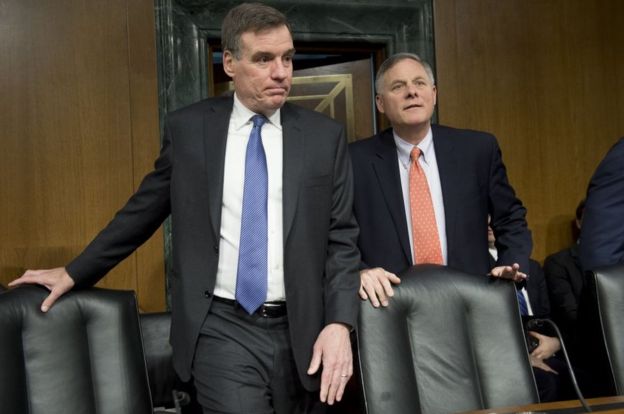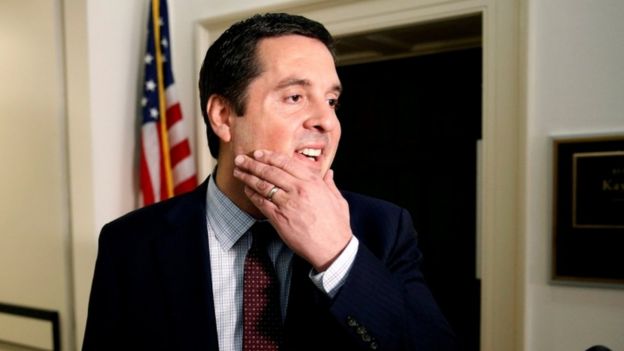
This article is more than
8 year oldA hearing by the Senate Intelligence Committee opened on Thursday. Jared Kushner, President Donald Trump's son-in-law, is to appear next week.
US intelligence agencies believe Russia tried to help Mr Trump win in November by damaging Hillary Clinton.
But Russian President Vladimir Putin has flatly denied the allegations.
In the committee's opening remarks, ranking Democrat Mark Warner said "Russia sought to hijack our democratic process" by employing a disinformation campaign on social media, which he describes as "Russian propaganda on steroids".
He said Thursday's session would examine how Russia may have used technology to spread disinformation in the US, including the possible generation of fake news for voters in key states, such as Wisconsin, Michigan and Pennsylvania.
Embarrassing "stolen information" was released through websites such as Wikileaks, Mr Warner said, at "seemingly choreographed times that would cause maximum damage to one candidate" - Hillary Clinton.
"They did this with an unprecedented level of sophistication," he said.

Committee chairman Richard Burr, a Republican, said "we are all targets of a sophisticated and capable adversary". He added that "if we politicise this, our efforts will likely fail".
Clinton Watts, a homeland security expert testifying before the committee, said Russian influencing continues presently against both US political parties, saying "they win because they play both sides".
"This past week we observed social media accounts discrediting [Republican] Speaker of the House Paul Ryan, hoping to further foment unrest inside US democratic institutions," he told the committee.
Mr Watts added that pro-Russian social media accounts continue to tweet at President Trump during times that they know he is online, hoping that he will read and cite fake news reports.
Former National Security Agency director Keith Alexander will be one of those testifying on Thursday.
Mr Kushner, who is married to Mr Trump's daughter Ivanka, volunteered to speak to the Senate Intelligence Committee, the White House has said, and is scheduled to appear next week.
In a joint press conference earlier this week, both Mr Burr and Mr Warner pledged not to shy away from the truth.
When asked if he had seen any links between Mr Trump and Russian interference, he said: "We know that our challenge is to answer that question for the American people.".
Mr Burr said that there had been "conversations" about interviewing Michael Flynn - who was sacked by Mr Trump as national security adviser for misleading the vice-president over his contacts with the Russian ambassador - but his appearance is not confirmed.
The Trump presidency has been unable to shake off allegations that members of its team colluded with Russian officials during the election campaign. The president has regularly dismissed the claims as "fake news" and Russia has also ridiculed the allegations.
President Vladimir Putin did so again on Thursday at an Arctic forum, describing them as "nonsense".

Mr Burr was a security adviser to the Trump campaign but insists he remains objective.
The House Intelligence Committee's inquiry into the matter has been beset by partisan disputes.
Ranking Democrat Adam Schiff has insisted panel chairman Devin Nunes remove himself, after accusing him of colluding with the White House.
Last week, Mr Nunes went straight to the White House after hearing allegations about surveillance of Mr Trump's team, rather than sharing them with Democratic colleagues on the panel.
He later apologised but insists he remains an objective chairman and will not step down.
As well as the two houses of Congress, the FBI is also conducting an investigation into the matter.